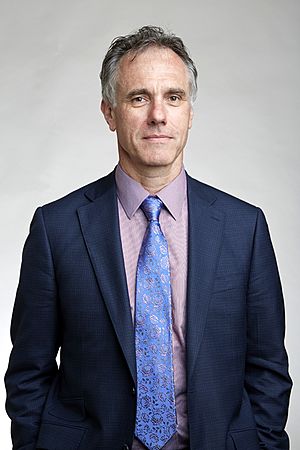Richard Marais facts for kids
Quick facts for kids
Richard Marais
FRS FMedSci MAE
|
|
|---|---|

Marais in 2018
|
|
| Alma mater | University College London Imperial College London |
| Awards |
|
| Scientific career | |
| Fields | |
| Institutions |
|
| Thesis | Comparative studies on protein kinase C isotypes (1989) |
| Doctoral advisor | Peter Parker |
| Other academic advisors | Richard Treisman Chris Marshall |
Richard Marais is a British scientist known for his important research on cancer. He worked as a Director at the Cancer Research UK (CRUK) Manchester Institute and was a Professor of Molecular Oncology at the University of Manchester. His work has helped doctors better understand and treat a dangerous type of skin cancer called melanoma.
Contents
Education and Early Career
Richard Marais went to University College London, where he earned a degree in Genetics and Microbiology in 1985. He then continued his studies and earned a PhD in 1989. For his PhD, he researched a type of enzyme called protein kinase C (PKC).
After finishing his education, Marais worked as a researcher at a few different places. He first worked at the Imperial Cancer Research Fund in London. Later, he joined the Institute of Cancer Research (ICR). In 1998, he started his own science lab at the ICR before moving to Manchester in 2012 to continue his work.
Fighting Cancer with Science
Professor Marais's research focuses on figuring out how cancers like melanoma work. By understanding the science behind the disease, he helps find better ways to treat patients.
Understanding Melanoma
One of Marais's biggest discoveries was about a gene called B-RAF. He was part of a team that found that a faulty or mutated B-RAF gene is a major cause of melanoma. This was a huge step forward because it showed scientists what to target when creating new medicines.
His work helped create new drugs that specifically attack cancer cells with the faulty B-RAF gene. He also studied why some cancer drugs stop working over time, a problem called drug resistance. Understanding this helps doctors develop smarter treatment plans for their patients.
Marais's research also showed how important it is to protect yourself from the sun. He stressed that using sunscreen and other ways to avoid too much sun can lower the risk of getting melanoma.
Awards and Recognition
Richard Marais has received many awards for his life-saving research.
- In 2008, he was made a Fellow of the Academy of Medical Sciences (FMedSci).
- In 2009, he was elected a member of the European Molecular Biology Organization (EMBO).
- In 2012, he and his team won the Team Science Award from the American Association for Cancer Research (AACR) for their work on cancer drugs.
- In 2016, he received the Leopold Griffuel Prize, a major award for cancer research.
- In 2018, he was elected a Fellow of the Royal Society (FRS), one of the highest honours for a scientist in the UK.
When he was elected to the Royal Society, they praised his work on how cells communicate and how this goes wrong in cancer. They highlighted his discovery that the B-RAF gene causes melanoma and his work in turning that discovery into a target for new medicines.
 | Frances Mary Albrier |
 | Whitney Young |
 | Muhammad Ali |

